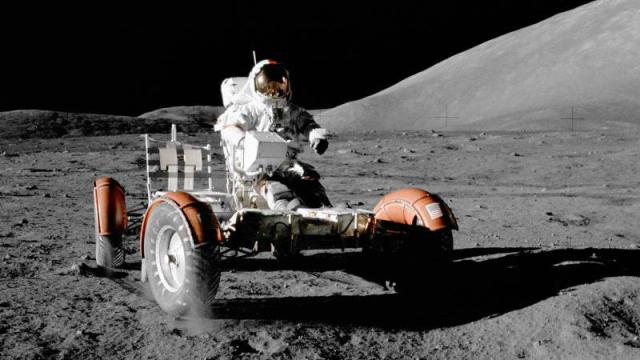Getting to the Moon is hard, but it’s considerably easier when you have a $US20 million ($26 million) prize to motivate you. That’s why teams from all over the world are battling it out to win that nice chunk of change in the Google Lunar XPRIZE challenge. If all goes according to plan, the winning private company will send a rover to the Moon sometime this year, so it can roam around and beam cool pictures back to Earth.
Image credit: NASA/JPL
Originally, 16 teams vying to compete had until 31 December 2016 to have a verified launch contract in place. Now, XPRIZE has selected five teams to advance to the final stages of the competition: SpaceIL (Israel), Moon Express (USA), Synergy Moon (International), Team Indus (India) and HAKUTO (Japan). Though SpaceIL and Moon Express have had launch contracts in place since late 2015, the other teams had to scramble to get similar contracts by the end of 2016 in order to continue.
HAKUTO is expected to launch this December, while SpaceIL will send its spacecraft to the Moon using a SpaceX Falcon 9 rocket in the second half of 2017.
“The Google Lunar XPRIZE has done a great job inspiring teams worldwide to shoot for a dream thought only within the reach of governments, while bringing a focus back to the Moon as an important destination for expansion as a multi world species,” Bob Richards, founder and CEO of Moon Express, told Gizmodo.
Each team’s ambitions for reaching the Moon are remarkably different. SpaceIL, for example, is mainly concerned with the educational impact a lunar landing could have on the next generation of Israeli space enthusiasts. Moon Express, on the other hand, wants to explore commercial possibilities on the Moon, such as mining it for iron ore, water and precious minerals.
It’s also a good opportunity to prove for the 100th time that the Apollo landings were not a hoax.
Though 11 teams won’t advance to the finals, Google was impressed enough by every group’s ingenuity it decided to split a $US1 million ($1.3 million) diversity prize among them. Not too shabby.
The final five have until 31 December 2017 to initiate their launches. The first team to successfully land its uncrewed spacecraft, move a 500m and beam high-definition photos and video footage back to Earth will nab the $US20 million ($26 million) grand prize. The second team to accomplish that will be awarded $US5 million ($6.5 million), and more money will be distributed to teams who go above and beyond basic requirements (for example, travelling long distances, taking photos of Apollo sites).
No pressure, though.
